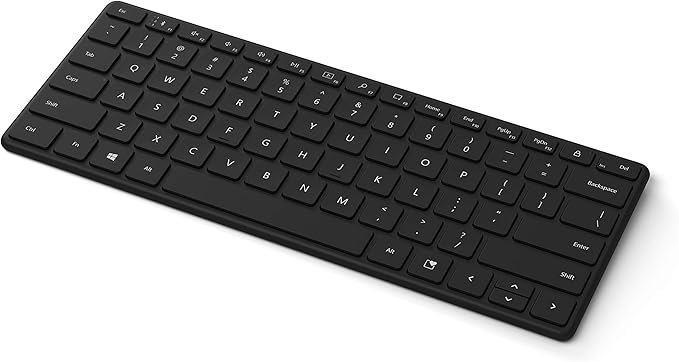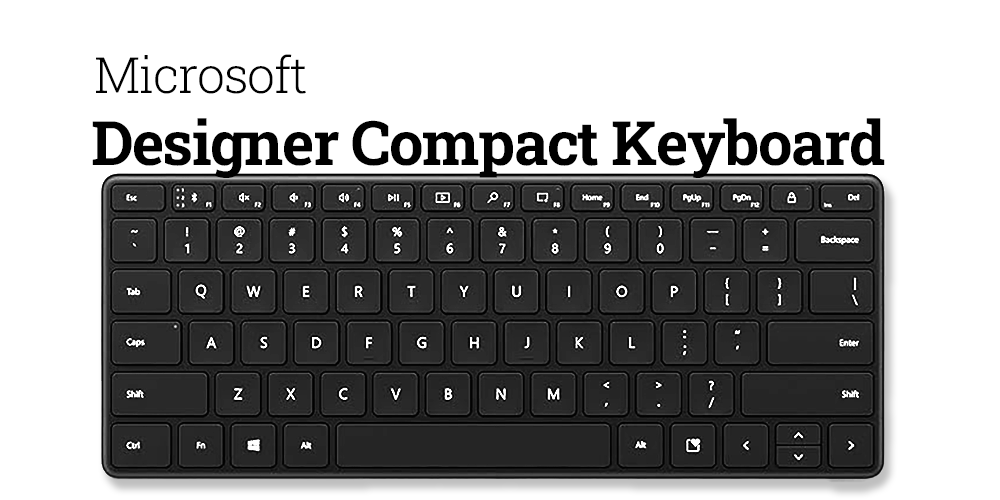Microsoft Designer Compact Keyboard Review
So Close to Perfection
After testing multiple keyboards in my quest for the perfect typing companion, I’ve finally completed my review of the Microsoft Designer Compact Keyboard – the fourth contender in my search for an ideal keyboard replacement.
My Keyboard Journey
I’ve tested five keyboards in this series:
- Keychron B1 Pro ($58)
- Lofree Flow Lite ($119.99)
- Microsoft Designer Compact Keyboard ($36.99) – featured in this review
- iClever Bluetooth folding keyboard ($38.99)
- Ugreen Keyboard ($40)
My current daily driver is a Microsoft series numeric keypad, which I’ve been quite pleased with. I purchased the Microsoft Designer Compact Keyboard from Amazon at $36.99 with shipping included.
What I Look for in a Keyboard
Unlike keyboard enthusiasts who obsess over switch types and customization options, my requirements are straightforward:
- Clean English keyboard layout
- Lightweight and portable design
- Minimal key mapping changes
- No palm rest (too bulky for my needs)
Microsoft Designer Compact Keyboard Specifications

Here are the detailed specifications of the Microsoft Designer Compact Keyboard. For comparison, I’ve included the Elecom mini keyboard I’ve been using until now.
| Feature | Microsoft Designer | Elecom $29.99 (Previous Keyboard) |
|---|---|---|
| Key pitch | 19mm | 19mm |
| Minimum key height | 8mm | 10mm |
| Maximum key height | 12mm | 20mm |
| Key press depth | 1.2mm | 1.5mm |
| Connection | Bluetooth (3 devices) | Bluetooth (3 devices) |
| Power source | Button batteries | 2 x AAA batteries |
| Backlight | None | None |
| Key map customization | Partially possible | Not possible |
| Weight | 284g | 281g |
| Dimensions | 28.5 x 11.1 x 1.2cm | 28.5 x 12.2 x 2cm |
| Price | $36.99 | $29.99 |
Button Battery Power – Better Than Expected
Initially, I was concerned about the button batteries. However, after reading reviews mentioning approximately 2 years of battery life, my concerns diminished. Even if replacement is necessary, button batteries are widely available. This might even be preferable to non-replaceable rechargeable batteries that degrade over time.
Premium Feel in a Thin Package
The Microsoft Designer Compact Keyboard’s greatest strength is its excellent build quality. Despite being made of plastic, the matte-coated surface provides a premium feel that’s visibly superior to the budget Elecom keyboard.
The typing experience is smooth and refined, without the cheap “clack-clack” sound of lower-priced alternatives. Most impressively, it’s incredibly thin – even the highest keys measure only 12mm, making it the thinnest non-folding keyboard I’ve tested.
Exceptional Ergonomics
This keyboard’s thin profile makes it exceptionally wrist-friendly. While taller mechanical keyboards often require palm rests to prevent wrist strain, the Microsoft Designer Compact Keyboard eliminates this need entirely.
The low-profile design allows for a more natural wrist position during extended typing sessions – a significant advantage for comfort and potential reduction in repetitive strain issues.
The Customization Barrier
Despite its many strengths, the Microsoft Designer Compact Keyboard falls short in one critical area: customization. When I set the right Alt key as the “Convert” key, it broke the Alt+Tab shortcut functionality since the keyboard couldn’t distinguish between left and right Alt keys.
This created a frustrating situation where fixing one issue caused another problem. Unfortunately, this keyboard just wasn’t fully compatible with my specific workflow requirements.
Final Verdict: Good, But Not $36.99 Good
The Microsoft Designer Compact Keyboard is undeniably excellent. It offers a premium feel, ultra-thin design, and impressive battery life. But when compared to the $29.99 Elecom keyboard, the improvements are relatively minor.
The question becomes: is it worth the additional cost for slightly better build quality and marginally reduced thickness? For most users, probably not.
What matters most is reliability, ease of replacement, and overall value. All keyboards eventually show wear with extended use, so having one that’s inexpensive to replace becomes a significant advantage.
In the end, the Elecom $29.99 keyboard remains my champion, though the Microsoft Designer Compact Keyboard came remarkably close to taking the crown. It was a photo finish in this keyboard showdown.


